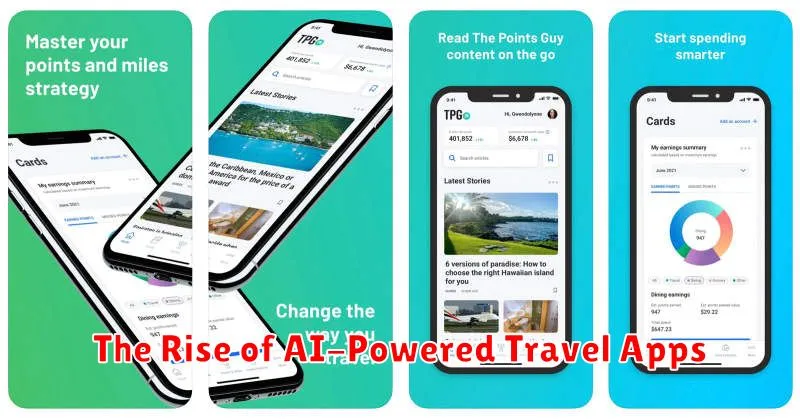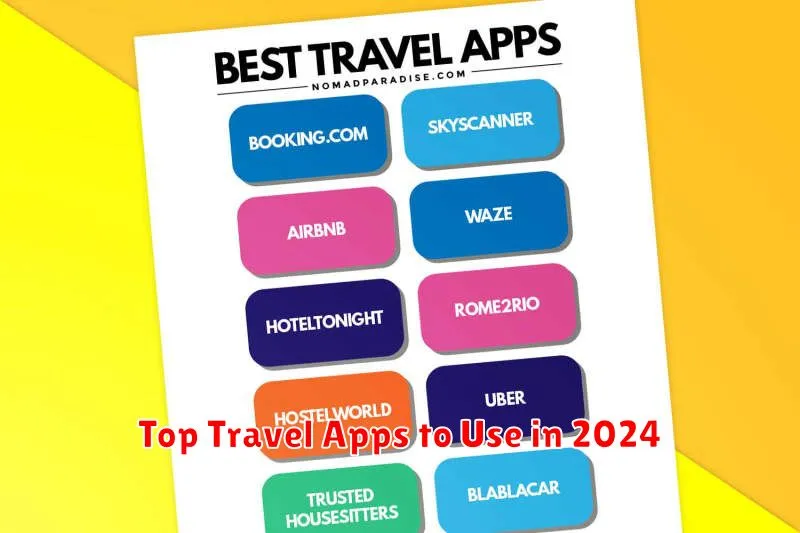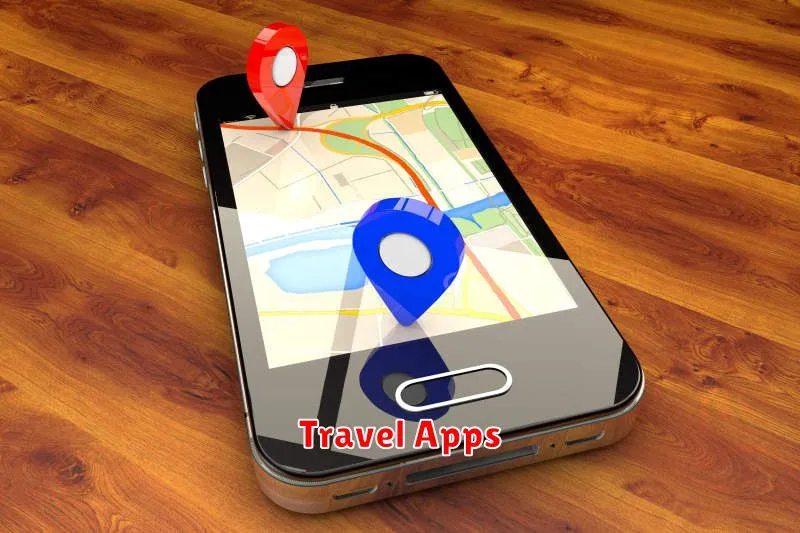In today’s fast-paced world, we’re constantly looking for ways to simplify our lives and make things more convenient. The travel industry is no exception. With the rise of mobile technology, mobile apps have become essential tools for travelers, revolutionizing the way we plan, book, and experience our trips. From finding the best deals on flights and hotels to navigating unfamiliar cities, travel apps offer a plethora of features that cater to every aspect of our travel needs.
The impact of mobile apps on the travel industry is undeniable. They have empowered travelers with unprecedented control over their journeys, allowing them to customize every detail. Whether you’re a seasoned globetrotter or a first-time traveler, there’s an app out there to help you plan the perfect getaway. This article will explore the many ways in which mobile apps are transforming the travel industry, and how they are changing the way we travel for the better.
The Rise of AI-Powered Travel Apps

The travel industry is undergoing a dramatic transformation thanks to the emergence of AI-powered mobile apps. These apps are leveraging the power of artificial intelligence to revolutionize the way we plan, book, and experience travel.
One of the most significant impacts of AI-powered travel apps is the personalization of travel recommendations. By analyzing user data, these apps can tailor suggestions to individual preferences, making it easier to discover destinations, accommodations, and activities that align with specific interests and budgets.
Another key benefit of AI-powered travel apps is streamlined booking processes. These apps can automate tasks like flight and hotel reservations, providing real-time availability and pricing information. AI algorithms can also identify and suggest optimal travel routes, saving time and effort for travelers.
Furthermore, AI-powered travel apps are enhancing the travel experience itself. By using real-time data, these apps can provide personalized recommendations for restaurants, attractions, and events. They can also assist with navigation and language translation, making travel more convenient and enjoyable.
The rise of AI-powered travel apps is transforming the travel industry in unprecedented ways. By leveraging the power of artificial intelligence, these apps are making travel more personalized, efficient, and enjoyable. As AI technology continues to evolve, we can expect even more innovative and user-centric travel experiences in the future.
How Mobile Apps Enhance the Travel Experience
In today’s digital age, mobile apps have become indispensable companions for travelers, revolutionizing the way we plan, book, and experience our journeys. From flight and hotel bookings to navigation and local recommendations, travel apps offer a plethora of features that enhance convenience, efficiency, and overall travel satisfaction.
One of the most significant ways mobile apps enhance the travel experience is by simplifying the booking process. Travelers can easily search for and compare flights, hotels, and rental cars, all within a single app. Real-time updates on prices, availability, and reviews empower travelers to make informed decisions and secure the best deals.
Furthermore, travel apps provide seamless navigation and destination information. With built-in GPS, users can navigate unfamiliar cities with ease, finding their way to attractions, restaurants, and accommodations. Many apps also offer curated local recommendations, showcasing hidden gems and off-the-beaten-path experiences.
Travel apps also enhance the travel experience by providing valuable information and support throughout the journey. Real-time flight updates, gate changes, and baggage tracking ensure smooth airport navigation. Language translation features facilitate communication in foreign countries, while currency converters simplify financial transactions.
Moreover, travel apps foster a sense of community by connecting travelers with each other. Social media integration allows users to share their experiences, recommendations, and photos, creating a virtual travelogue and inspiring others.
In conclusion, mobile apps have significantly enhanced the travel experience, transforming it from a stressful and complex endeavor to a seamless and enjoyable adventure. By providing convenience, information, and community, these apps empower travelers to explore the world with confidence and ease.
Security Concerns with Travel Apps
While travel apps offer numerous conveniences, they also present security concerns that users should be aware of. Data breaches are a major risk, as apps often store sensitive information like credit card details, passport numbers, and travel itineraries. If these details fall into the wrong hands, it could lead to identity theft and financial fraud.
Another concern is the use of malware. Some apps may contain malicious code that can steal data or track your online activity. It is important to download apps from reputable sources and to be cautious about granting them access to your device’s permissions.
Privacy is another significant issue. Travel apps often collect a substantial amount of personal information, such as location data, browsing history, and travel preferences. This information can be used for targeted advertising or sold to third parties. It’s crucial to read the app’s privacy policy carefully before providing any personal information.
Finally, authentication is a vital security aspect. Weak passwords or inadequate security measures can make it easier for hackers to gain access to your accounts. It’s essential to use strong passwords and enable two-factor authentication whenever possible.
To mitigate security risks, it’s crucial to choose reputable apps with strong security features, read the privacy policy carefully, use strong passwords, enable two-factor authentication, and be cautious about granting app permissions.
Top Travel Apps to Use in 2024

The travel industry has been revolutionized by mobile apps, offering a range of features that make planning and experiencing journeys easier than ever. From booking flights and accommodations to navigating new cities and managing expenses, these apps cater to every aspect of modern travel. Here are some of the top travel apps to use in 2024:
Booking and Planning
Skyscanner: A powerful flight search engine that compares prices from multiple airlines, making it easy to find the best deals.
Booking.com: A comprehensive platform for booking accommodations, offering a wide selection of hotels, apartments, and other lodging options.
TripAdvisor: A popular travel platform that provides reviews, photos, and information on hotels, restaurants, attractions, and activities.
Google Trips: A handy app that helps you plan your trips by organizing your bookings, itineraries, and travel information in one place.
Navigation and Exploration
Google Maps: The most widely used navigation app, offering real-time traffic updates, directions, and street views.
Citymapper: A great app for navigating public transportation in major cities, providing comprehensive transit schedules and route planning.
Rome2Rio: A unique app that helps you find the best routes between destinations, including options for flying, driving, trains, buses, and ferries.
On-the-Go Essentials
XE Currency Converter: A convenient app for converting currencies in real time, helping you budget effectively during your travels.
Duolingo: A fun and effective app for learning new languages, perfect for enhancing your travel experiences.
WhatsApp: A popular messaging app that allows you to communicate with friends and family overseas, even without international calls.
The Future of Travel with Mobile Technology
Mobile technology is rapidly changing the travel industry. With the rise of smartphones and tablets, travelers now have access to a wealth of information and tools at their fingertips. This has led to a surge in the development of travel apps, which are revolutionizing the way we plan, book, and experience our trips.
One of the most significant impacts of mobile technology is on travel planning. Apps like Google Maps, Tripadvisor, and Lonely Planet allow travelers to research destinations, find attractions, and read reviews from other travelers. These apps also provide real-time information on traffic, weather, and flight delays, making it easier than ever to plan a trip.
Mobile technology is also simplifying the booking process. Travelers can now book flights, hotels, and rental cars directly from their phones, often at discounted rates. Apps like Kayak, Skyscanner, and Expedia allow users to compare prices from multiple airlines and travel agencies, making it easy to find the best deals.
During a trip, mobile apps are transforming the travel experience. Navigation apps like Google Maps and Waze make it easy to get around unfamiliar cities. Translation apps help travelers communicate with locals. Mobile payment apps allow travelers to pay for purchases and services without having to carry cash.
The future of travel is undoubtedly mobile. As technology continues to advance, we can expect even more innovative travel apps and services to emerge. Mobile technology will continue to make travel more convenient, efficient, and enjoyable for everyone.
Case Studies: Successful Travel Apps
The travel industry has undergone a dramatic transformation thanks to the rise of mobile apps. These apps have made it easier than ever for travelers to plan, book, and manage their trips. From booking flights and hotels to finding local attractions and navigating unfamiliar cities, travel apps have become indispensable tools for modern travelers.
Here are some case studies of successful travel apps that have revolutionized the industry:
Airbnb
Airbnb, a platform for booking unique accommodations, has disrupted the traditional hotel industry by connecting travelers with hosts offering rooms, apartments, and other unique spaces. Airbnb’s success can be attributed to its user-friendly interface, wide selection of listings, and strong community focus.
Skyscanner
Skyscanner is a leading metasearch engine for flights that compares prices from multiple airlines and travel agents. The app’s intuitive search functionality and real-time price alerts have made it a popular choice for budget-conscious travelers.
TripAdvisor
TripAdvisor is a travel platform that provides reviews, ratings, and recommendations for hotels, restaurants, and attractions. The app’s extensive database of user-generated content helps travelers make informed decisions about their travel plans.
Google Maps
Google Maps is an essential app for travelers, providing detailed maps, real-time traffic updates, and navigation assistance. Its integration with other Google services like Search and Translate makes it a comprehensive travel companion.
These are just a few examples of how mobile apps are revolutionizing the travel industry. By offering convenience, personalized experiences, and cost-effective solutions, these apps are transforming the way we travel. As technology continues to advance, we can expect to see even more innovative and user-friendly travel apps emerge in the years to come.

